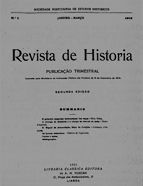

................................
The Modern and Contemporary periods dominated RH’s focus, aligning with contemporary trends. Key themes included Literary History, largely due to Fidelino’s influence, as well as Political and Diplomatic History, Religious History, Biography, and Historiography or Historical Theory ( A SPEH no contexto historiográfico nacional , pp. 65-71).
The Revista de História was also an open platform for discussion and included a significant informational component on historical matters, such as the promotion of open courses, topics related to history teaching, and reviews of foreign and national bibliographies, among others. Within the discussion space, controversies were published, such as those between António Prado Coelho and Fidelino de Figueiredo (regarding Balzac and the pertinence of a psychological study of the author), as well as between Fidelino de Figueiredo, José Leite Vasconcelos, and Menéndez y Pelayo (critical notes on J. L. Vasconcelos's work Religiões da Lusitania , 1905).
The Sociedade Portuguesa de Estudos Históricos came to an abrupt end, closely linked to the attempted coup of 12 August 1927, which became known as the Golpe dos Fifis . In addition to various military participants, such as Henrique Galvão, Alfredo Morais Sarmento, David Neto, and Filomeno da Câmara, Fidelino de Figueiredo was also associated with it. Following his subsequent exile, it did not take long for the SPEH to cease its activities. However, this was not immediate. The final volume of the Revista de História attests to this, covering the years 1927 and 1928, demonstrating a final burst of vitality. Nevertheless, with Fidelino de Figueiredo in Spain, no further issues of the journal were published.
This marked the end of a society of historians—the first exclusively composed of historians rather than archaeologists, engineers, or other professionals. Despite this, intellectuals and scholars participated, and the society existed for approximately the same period as the First Republic, providing an embryonic impetus towards the professionalisation of historical studies in Portugal. It would not be incorrect to state that the SPEH and the thought and actions of Fidelino de Figueiredo were closely intertwined, perhaps even inseparable. It cannot be dismissed that both the SPEH and RH may have been part of an individual strategy by Fidelino to establish legitimacy in the eyes of the most respected historians. However, if this was the case, it should be noted that recognised historians—such as the other signatories of the circular- programme—acknowledged Fidelino’s initiative and organisational capacity in creating such an association during a period of methodological and theoretical debate in historical studies. As Fidelino recalled in 1954: “Only now, so many years later, do I fully grasp the extent of the kindness and trust of the distinguished men who promptly responded to the call of a young and unauthoritative voice” ( Historiografia Portuguesa do Século XX , p. 336). These memberships can, however, also be seen as indicative of the weariness with the scientific and cultural conventions of the time. Yet the most significant achievement was the intellectual and civic mobilisation that was realised.
This work is financed by national funds through FCT - Foundation for Science and Technology, I.P, in the scope of the projects UIDB/04311/2020 and UIDP/04311/2020.
